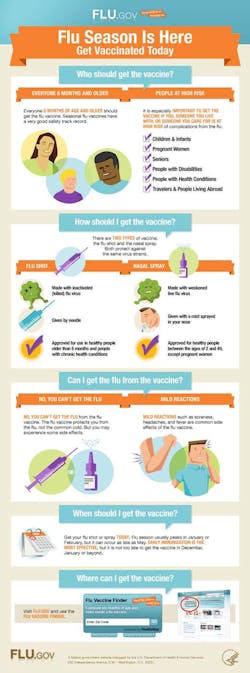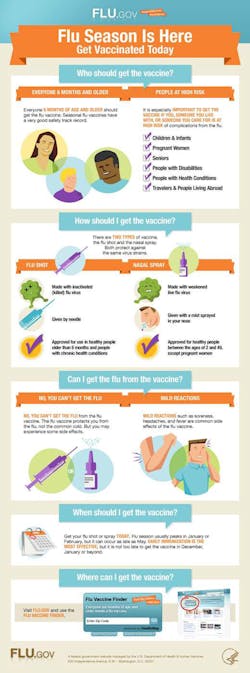Flu vaccine and cardiovascular health
Influenza is a serious disease that can lead to hospitalization and sometimes even death. Every flu season is different, and influenza infection can affect people differently. An annual seasonal flu vaccine, either the flu shot or the nasal-spray flu vaccine, is the best way to reduce the chances that you will get seasonal flu and spread it to others.(1) When more people get vaccinated against the flu, less flu can spread through that community.
(2)With flu season approaching, physicians recommend that people get a flu shot. Among nontraditional cardiovascular risk factors, recent influenza, like infection, is associated with fatal and nonfatal atherothrombotic events. Past studies suggest that the vaccine may help protect heart patients from heart attack, stroke and even dying from heart disease. New research reviewed what happens to patients with heart disease who receive the flu vaccine compared to a placebo or standard care. According to this new study, if one gets an influenza vaccination, it could be associated with a lower risk of major adverse cardiovascular events such as heart failure or hospitalization for heart attack. The greatest treatment effect seen among patients with recent acute coronary syndrome (ACS), such as heart attack or unstable angina), according to a recent meta-analysis.(3) Among nontraditional cardiovascular risk factors, there is a concern with a potential association between respiratory tract infections, of which influenza and influenza-like illnesses are common causes, and subsequent cardiovascular events.(3) Several epidemiological studies have suggested a strong inverse relationship between influenza vaccination and the risk of fatal and nonfatal cardiovascular events. A recent meta-analysis of all randomized clinical trials (RCTs) of influenza vaccine that looked at cardiovascular events as efficacy or safety outcomes to determine if influenza vaccination is associated with prevention of cardiovascular events. In the 5 published RCTs, 95 of 3,238 patients treated with influenza vaccine (2.9 percent) developed a major adverse cardiovascular event compared with 151 of 3,231 patients (4.7 percent) treated with placebo or control within 1 year of follow-up, an absolute risk difference favoring flu vaccine of 1.74 percent. The addition of the unpublished data did not materially change the results (2.9 percent influenza vaccine vs. 4.6 percent placebo or control). In a subgroup analysis of 3 RCTs of patients with pre-existing coronary artery disease (CAD), the risk of major adverse cardiovascular events among patients with a history of recent ACS was especially lower with vaccine (10.3 percent influenza vaccine vs. 23.1 percent placebo or control), an absolute-risk difference of 12.9 percent, compared to patients with stable CAD (6.9 percent influenza vaccine vs. 7.4 percent placebo or control). Results were similar with the addition of unpublished data. The authors concluded that, within this global meta-analysis of RCTs that studied patients with high cardiovascular risk, influenza vaccination was associated with a lower risk of major adverse cardiovascular events within 1 year. Influenza vaccination was particularly associated with cardiovascular prevention in patients with recent ACS. Future research with an adequately powered multicenter trial to confirm the efficacy of this low-cost, annual, safe, easily administered, and well-tolerated therapy to reduce cardiovascular risk beyond current therapies is warranted. The clinical implications are that we should educate people about the importance of the influenza vaccination to prevent the flu, and possible other advantageous benefits. There are proven ways to increase vaccination coverage, including expanding access through nontraditional settings (e.g., pharmacy, workplace, school venues), improving the use of evidence-based practices at medical sites (e.g., standing orders, reminder or recall notification), and using immunization registries. One of the most consistent and relevant findings of operational research is that recommendation for vaccination from physicians and other health care professionals is a strong predictor of vaccine acceptance and receipt among patients. While few are in a position to develop new influenza vaccines, all health care practitioners can recommend influenza vaccine to their patients. Doing so will help achieve the goal of 100 percent vaccination for the 2013-2014 influenza season.
For more information, visit the website.(4) To view another infographic about getting vaccinated for the flu season, click here.References 1. http://www.cdc.gov/flu/protect/keyfacts.htm. 2. http://www.flu.gov/prevention-vaccination/vaccination/flugov_infographic.html#. 3. Udell JA, Zawi R, Bhatt DL, et al. Association Between Influenza Vaccination and Cardiovascular Outcomes in High-Risk Patients: A Meta-analysis. JAMA. 2013; 310(16):1711-1720. doi:10.1001/jama.2013.279206. 4. http://www.flu.gov/#.



